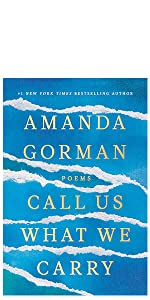Gorman advocates hope and healing

Penguin Young Readers Group
February 14, 2022
Amanda Gorman’s “Call Us What We Carry” is hopeful, relentless and reflective as it explores lifetimes of pain and perseverance. With a primary focus on the Covid-19 pandemic, the poetry collection branches out to cover racism, climate change and politics. Poetry may not be for everyone, but Gorman’s work is more than rhymes and figurative language; it is relevant and necessary in today’s difficult times.
The title, “Call Us What We Carry,” takes on many meanings across various poems, including that it seeks for the world to take collective ownership of the pandemic and its effects. Divided into seven parts and packed with dozens of poems, the collection begins at the start of the pandemic and examines a plethora of global issues throughout time.
Gorman’s style, which includes extended metaphors, clever word play and mostly free verse poetry, is engaging and fun to decipher across her poems. Although she seeks to represent the shared experiences of all people, particularly through using “we,” “us” and “our” pronouns, her own identity and personality shine through.
The Havard Graduate was pursuing a degree in sociology when schools shut down in March 2020, and she refers to her fellow remote learners as “Zoombies” in the poem “What We Did in the Time Being.” These kinds of quotes garner feelings of recognition; readers not only identify the speaker by her personal experiences, but can also identify with her. Feeling half-dead during last school year’s mind-numbing Zoom calls was a universal experience for many students.
Furthermore, Gorman frequently alludes to outside sources, from ancient philosophers to rapper Drake to the popular musical “Hamilton.” In fact, this book can be compared to Lin Manuel Miranda’s broadway hit about the founding fathers in terms of universal themes, modern social/political messages and profound lines that feel as though they are meant to be performed.
This does highlight one potential issue with the collection: the written form just doesn’t do the poems justice. In “The Miracle of Morning”, Gorman writes, “We ignite not in the light, but in lack thereof, / For it is in loss that we truly learn to love. / In this chaos, we will discover clarity. / In suffering, we must find solidarity.” Lines such as these deserve to be performed in spoken word, so the audience can feel the impact of the statement in the absence of clear imagery.
Aside from traditional stanzas, Gorman’s poems can be seen in creative shapes and formats, furthering the engaging quality of the work. One poem appears as a text conversation, while another is shaped like a whale; an entire chapter begins with black pages that fade to white, presenting visual symbolism that furthers her discussion of racism in America.
She is able to encapsulate this roller coaster ride of an era with her poetry because, despite publishing three books by the age of 23, being the first National Youth Poet Laureate and sharing the title of Inaugural Poet with legends like Maya Angelou and Robert Frost, Gorman remains humble. These impressive accomplishments are overshadowed by other aspects of her identity — young, student, daughter, raised by a single mother and black woman in America — which she chooses to highlight in “Call Us What We Carry.”
There are admittedly some areas that are difficult to comprehend, particularly when Gorman creates poems using altered excerpts from historical letters and literary works in the section entitled “Atonement.” In these instances however, the poems are still worth examining on the basis of conceptual and artistic value.
The book concludes with “The Hill We Climb,” which Gorman performed at President Biden’s inauguration on Jan. 20, 2021. This poem was the world’s introduction to Amanda Gorman, and it perfectly conveys a timeless message: “For there is always a light, / If only we’re brave enough to see it, / If only we’re brave enough to be it.” “Call Us What We Carry” forces readers to reflect on the past, but also inspires them to be the change of the future, and any book with such an effect is worth reading.
Overall, this book is a gift for poetry appreciators, the youth of today, the scholars of tomorrow and anyone who needs a little bit of hope as we power through the pandemic. Published Dec. 7, 2021, the 240 page poetry collection can be purchased for $14.53 on Amazon.com.






